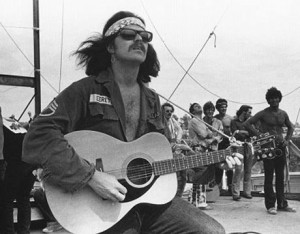Is classic rock really the best music ever made?
 The best answer to the question of why classic rock is something that deserves preservation is found in Joe Queenan’s hilarious generation-bashing book Balsamic Dreams:
The best answer to the question of why classic rock is something that deserves preservation is found in Joe Queenan’s hilarious generation-bashing book Balsamic Dreams:
“Baby Boomers have deluded themselves into thinking that what once mattered to them should now matter to others.”
Or maybe this is too much deep thought for what was, after all, another classic rock gig put on by the Rock and Roll Society of Edmonton, the first since the Edmonton Rock Festival this summer that featured a who’s who of Big Boomer Bands (including Country Joe, pictured above at Woodstock ‘69). The gig Saturday at the Blatchford Airfield Hangar in Fort Edmonton Park featured classic rock in abundance with the bands Boogie Patrol, The Big Rubber Band and The Frank.
New president Donna Semeniuk says the not-for-profit society was formed two years ago by a group of “passionate music lovers dedicated to the preservation and promotion of the music we grew up with.” The goal is to keep classic rock “alive” among youth, she adds, because society members agree that the music they grew up with was some of the greatest music ever made. “In many ways,” Semeniuk says, “it was the music that helped change the world.”
She admits that it might be a selfish illusion to assume greater importance to the music that she and her Baby Boomer peers grew up with than, say, LMFAO. Popular music being made today has yet to reveal what will stand the test of time 40 years from now. It’s easy to forget that what is called “classic rock” now is the music that was good enough to last. The crap has been sifted out in the sands of time. For every Beatles we remember, there were three Herman’s Hermits we’d prefer to forget. AC/DC prevailed. Uriah Heap did not. You see the point. And yet, as Semeniuk points out, “There are a lot of kids these days who listen to the same music their parents do.”
You don’t have to look hard for evidence. Teenage rock bands have been jamming Lennon and Zeppelin in basements and garages across the land for decades. In Edmonton lately, there’s a teenage band called DRT that plays Rush covers. Its drummer Riley is the son of K-97’s Terry Evans. The station is No. 1 among teenage sons of K-97 on-air staff. Every time Jeff Beck comes to town, you’ll see dads with teenage sons in tow. Back at home, you may find that they both own electric guitars. Back in the early ‘90s there was a band called the Colour Black whose teenage musicians were into George Thorogood and Stevie Ray Vaughan. One of its members was Stew Kirkwood, who is now a record producer who’s worked with a huge number of Edmonton rock bands.
These could be anomalies. Edmonton’s classic rock radio stalwart K-97 is actually near the bottom of the ratings heap for teenagers, despite game efforts with the type of humour that would appeal to a typical 14-year-old boy, so maybe classic rock needs preservation after all.
The Rock and Roll Society of Edmonton does more than just put on classic rock concerts for its own amusement. Its members have been recruiting area rockers to work with inner city kids and “youth at risk” with Afterschool of Rock programs. They do one-on-one musical instruction and form small bands. The society is soon to open a permanent jamming space in the basement of the Hull Block in the heart of Chinatown, Semeniuk says. You can bet on hearing some Lennon or Zeppelin emanating from within.
As Semeniuk says, “Today we feel so passionate that this music is so good, that it stood the test of time. But then I think: is it just an illusion? Do we just want to believe that? And 10 years from now, will people say, ‘The Stones? Who are they?’”
Not likely. For one thing, they’ll probably still be touring.











